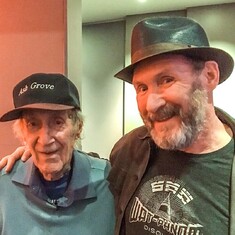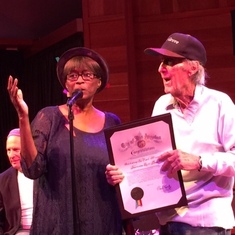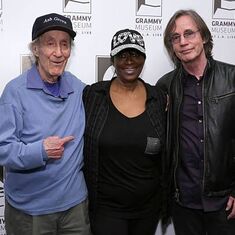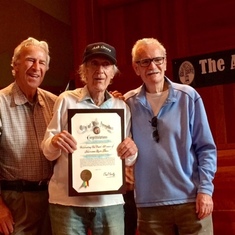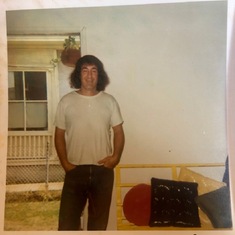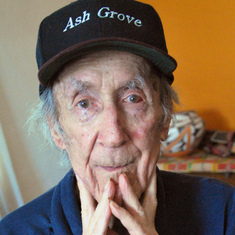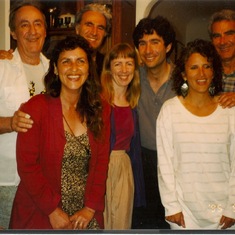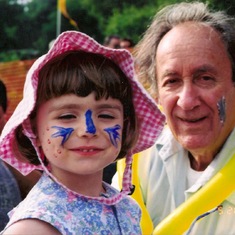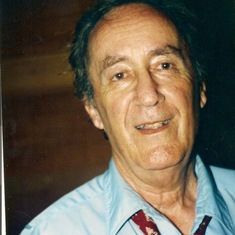Ed Pearl was not only a child of the Depression and the WWII years, but also a (grand)child of the first Russian Revolution; a non-conformist of the 1950s; and a political activist through it all into the 21st century. And, by the way, he was addicted to music and was the owner of the club that changed the music scene in Los Angeles for the better, the Ash Grove.
He died of COVID Sunday, February 7, 2021 at the age of 88. He is survived by his daughter, Jolie; his granddaughter, Ari; and three brothers, Bernie, Stanley and Sherman. He was predeceased by his sister Bernice and his step-daughter, Marni Hoyt. His death was not a surprise, but it was a shock. He had been struggling with the onset of Alzheimer’s for a few years prior. For the last year of his life, he lived in an assisted living facility which limited his contact with the outside world. Six months ago, he was still arguing politics and tapping his list of contacts to put together music shows. It's hard to imagine none of us will be getting calls from him for a favor to help out at a music event or attend a meeting.
His grandfather, who was both Jewish and political, had to whisk his family out of Russia when the 1903 Revolution was defeated. They ended up in Egypt where Ed’s father learned to be a tool and die maker, finally marrying and settling in Boyle Heights. And then came the Depression. Boyle Heights at that time was perhaps one of the most diverse places in the US with all flavors of immigrants – from Russian Molokans, Japanese, Mexicans, Jews from all over, Italians and Chinese, to Black migrants from the South and whites from the dust bowls of the central US. Ed reveled in this diversity and enjoyed growing up in spite of the difficult times.
As a teenager in 1945 he organized in his junior high school and brought students out of class to join a Los Angeles-wide student demonstration against an appearance at a school site of Gerald L. K. Smith; the noted anti-Black, anti-red, anti-Semitic hate monger of the time. Ed said of this event, “I saw how organization of people could be a powerful thing.” And he brought this consciousness forward when, as a student at UCLA in 1954, he involved himself with a group of students trying to bring Pete Seeger to campus for a concert. The administration would not allow it because Pete was blacklisted, so Ed found a large church across the street from campus and they staged the concert there. It was a tremendous success and Ed was launched as a producer. This led to producing several more concerts around Los Angeles. By 1957, after another full-house at a rented hall, Ed was sitting with Kate Hughes and Phil Melnick in Coffee Dan’s at Highland and Hollywood. Flush with success, the three hit on the idea to create a permanent music place of their own, where their friends would feel as comfortable as if they were at a living room hootenanny at Ed’s sister Bernice’s house. They saw that there were beatnik “coffee houses” springing up all over Los Angeles where there was music, but it was an after-thought. There were also fancy, commercial nightclubs with high prices. This would be different. It would be cheap enough for students to come. It would respect the music and the artists. It would be the Ash Grove.
Coincidentally, in the summer of 1958 when the Ash Grove opened with the help of family and friends, the Kingston Trio crashed the pop charts with
Tom Dooley and “Folk Music” became popular with millions of people across the country. The Ash Grove rode this commercial urban folk wave to plant itself in the LA club scene. Then in 1961 Ed booked the New Lost City Ramblers into the club for several weeks. This was the turning point that made the Ash Grove legendary.
Through the Ramblers and others Ed made the club a pipeline for traditional musicians, black and white, to audiences on the west coast. Many had made commercial records back in the 20s and 30s and were being “rediscovered.” Others were “front porch” entertainers carrying old musical traditions forward who were discovered by young people trekking south to find the roots of this music. Some were young people bringing music handed down from their parents, like the White Brothers and the Chambers Brothers and the Freedom Singers. The club became the place in Los Angeles to see and hear and meet and learn from these national treasures of American music in person, people like Lightnin’ Hopkins, Roscoe Holcomb, Mance Lipscomb, Doc Watson, Earl Scruggs, Bukka White, Lester Flatt, Rev. Gary Davis, The Stanley Brothers, and Bessie Jones with the Georgia Island Singers.
And there were people in the audience who sat night after night, learning, and went on to make their own music –Taj Mahal, Jackson Brown, Ry Cooder, Dave Alvin, David Cohen, David Lindley. Many became mainstays of the club’s calendar up to its closing days, even with the addition of the new kinds of music as Folk morphed into Folk-Rock, like Canned Heat that was virtually the house band for a while.
But Ed Pearl’s Ash Grove never just presented music. It was his intent that it also be a place for the cultures and environments of these artists to come through in photographs and film screenings. It was also a place where Ed’s progressive politics of justice and social change were welcome and given a platform. As the tumultuous 60s developed, from Civil Rights to Black Power, from pro-peace anti-nuke marchers to anti-Vietnam-war activists, the club became a place for meetings and discussions.
In the early days of the club Ed presented SNCC’s Freedom Singers to benefit Civil Rights organizing in the South. When he took on the task of organizing the registration campaign in Los Angeles to get the Peace and Freedom Party on the ballot, the Ash Grove became a center for that push. Ed supported the efforts of the Black Panthers to organize in their community, and the Ash Grove became an institutional ally. Ed used the Ash Grove to present programs on the new feminism and the student movement for Black and Chicano studies to be recognized in the curriculum. Ed disagreed with the United States’ isolation of Cuba and brought films and discussions about Cuba to the Ash Grove. This attention to Cuba was noticed by Anti-Castro organizations that led to the three arson fires.
Ed has said that after the Ash Grove totally burned in 1973 and closed for good he took a 10-year vacation, moving to Venice CA and drinking a lot. But he still produced programs and benefits, even more closely in congruence with his active engagement in politics – such as concerts with Chilean musicians who escaped from the Pinochet regime and anti-apartheid programs for Los Angeles public schools. He still had his phonebook and contacts and personal relationships that could get a concert on stage and an audience into the hall. He kept doing stuff. A series of very successful concerts along the West Coast, from Seattle to San Diego, with Phil Ochs, Holly Near and Mimi Farina, among others. The production of the San Francisco Mime Troupe’s version of Brecht’s “The Mother” for three sold-out nights at the Venice Fox Theater. The 1976 People’s Bicentennial. The 1985 KPFK Winterfest fundraiser among so many other benefits and fundraisers for which he arranged stellar performers. And a long-running folk music show on KPFK. And, later, his daily e-mail of interesting news articles and opinion from across the political spectrum, with his notes about events that became a daily bulletin board for the progressives of Los Angeles. It was a lot. But his goal was always to re-establish the Ash Grove as a permanent location.
There were several locations where Ed tried to put all the pieces together. One was on Santa Monica Boulevard in Hollywood. In the late 80’s a location, some plans, and even a few events there materialized. But in the end it didn’t happen.
Then a great opportunity opened up on the Santa Monica Pier in 1991. Working with the city in a redevelopment program for the Pier and a host of individuals who invested in his dream, Ed opened a new Ash Grove in 1996. In spite of outstanding performers and good attendance, the club did not survive financially. It closed in 1997.
But Ed was undeterred. He kept looking for the right place and the right combination. For three days in April 2008 on the UCLA campus, Ed and a large crew of supporters put together a 50th Anniversary Festival. With three major concerts and two days of free workshops it brought together many alumni of the Ash Grove on both sides of the footlights – musicians and audience members. The flavor of the Ash Grove existed in those rooms that weekend. Ed, citing that Barack Obama was on the campaign trail for the Democratic nomination for President, said from that stage that a new Ash Grove is needed even more than ever.
After the 50th Anniversary Festival Ed turned his attention to the non-profit he’d created, Ash Grove Music, Inc., to continue the mission of the club. Working with a board he continued to look for new ways to establish a permanent venue and also put on concerts and workshops around Los Angeles. In 2019 the Ash Grove non-profit was folded into a sister organization, GetLit, whose founder Diane Luby Lane had been mentored by Ed. GetLit is an organization focused on bringing high school students into an active engagement with poetry. The Ash Grove connection was made with the intention of expanding that focus to include music and giving recognition to folk poetry on a par with written poetry.
In all of these enterprises Ed was conscious that he was not working alone. The list of names of people who were his collaborators and supporters and critics and arguers and enablers would be so long as to approach the infinite. You know who you are. You know what your contributions were. You are all part of making the Ash Grove live on through the music you make and the justice you demand.
We plan to hold an in-person community-based memorial for Ed once things have calmed down with COVID, likely in 2022. An announcement will be posted here.If you would like to make a donation in Ed’s memory, here are three suggestions (but feel free to give a donation to an organization of your choosing):
Ed entrusted Get Lit to carry on the mission of the Ash Grove. Donations can be made at GetLIt.org. Please mark your donation “Ash Grove Music Fund in memory of Ed Pearl.”
Ed actively supported the Center for the Study of Political Graphics, which collaborated with him on many musical and political events.
Ed was a faithful listener and supporter of DemocracyNow! for their in-depth news and analysis.
Please contribute to Ed's memory by leaving a tribute, story or photograph on this site.
